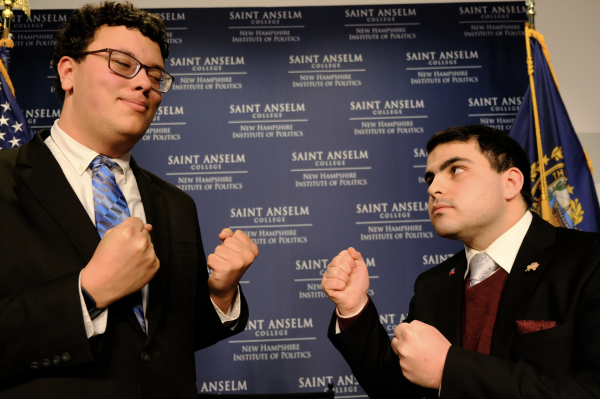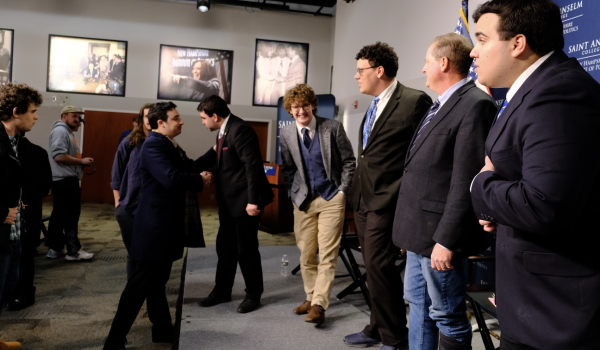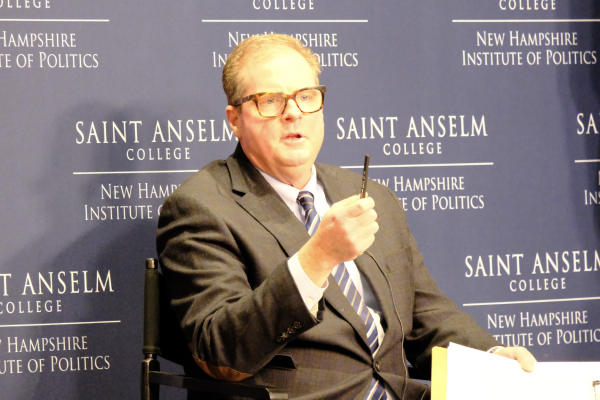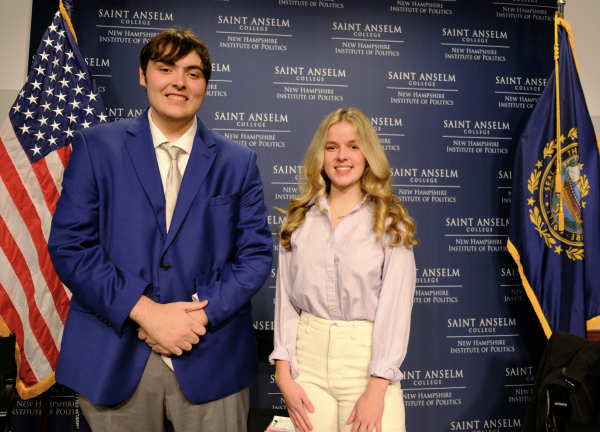Left Hook, Right Jab has been running for eight months. Every issue, Kellan Barbee and Mac Connors of the College Democrats and Republicans, respectively, respond to a series of questions about politics and current events. Last week, Mac and Kellan debated live at the New Hampshire Institute of Politics in an event moderated by NHIOP director Neil Levesque. This week’s questions are based on the ones asked at that debate.
What is the state of civic discourse at Saint Anselm College?
L: The state of civic discourse here at Saint Anselm College is strong and healthy. The events at the Institute of Politics and the College Democrats and Republicans Debate on November 29th prove this. Even on charged topics that strongly divide our campus, we rise above insults and personal attacks to have difficult and civil conversations because they are necessary.
R: At Saint Anselm College, civic discourse is alive and encouraged. This is one factor that sets this college apart from others. This college does not try to censor students and color different opinions that dissent from orthodoxy as “bias” or “hate speech.” As in any discussion, we must always base our opinions on facts and objective truth. It is extremely important that we continue to have these civic discussions, and I am very grateful to Kellan and the College Democrats for being such great counterparts in this dialogue.
Is there a need for reforming gun laws in this country?
R: There is not a need for reforming gun laws in this country. The solution to the violence problem plaguing America now is an increased need for mental health assistance. While most guns used to commit crimes are bought legally, criminals will find a way to commit a crime in one way or another. It is preposterous to propose that merely banning guns or restricting their use will stop criminals because they are already breaking other laws by slaughtering people in their acts. A law does not stop a criminal, but a law-abiding citizen with a gun does stop them. However, the government should look into legislation that is constitutional to make people store their guns in a safer manner and increase penalties for people who allow their guns (whether intentionally or accidentally) to get into the hands of someone else.
L: Gun laws desperately need reform in the United States. It is a fact that guns keep people safe. That being said, guns also kill. When we talk about reform on gun issues, the purpose should not be solely to prohibit gun ownership but to make gun ownership safer. Weapons of war and military-style semi-automatic assault weapons have no place in civilian hands or being used outside theaters of war. Common-sense reforms with broad support in both parties, like mandatory background checks and gun safety education, are simple ways to reform gun ownership and keep innocent Americans from losing their lives at the hands of a gun.
What presents the largest threat to American democracy?
L: The largest threat to American democracy is the erosion of trust in society, one another, and our institutions. The trust we place in each other as humans is the oil that makes the machine of a society function. Policy-wise, the biggest threats to our democracy all stem from a basic lack of trust or, at the very least, exploiting it– the idea that the 2020 presidential election was “stolen” finds its origins in concerning the lack of trust a vocal minority places in our democracy. Social media companies have a monetary interest in pitting Americans against each other, sowing discord and distrust, and forcing voters toward the extreme ends of their respective political leanings. This polarization feeds distrust and creates a self-perpetuating echo chamber where themes of division are reinforced.
R: The largest threat to American democracy is the breakdown in localism in this country. There is both a governmental and social aspect to this problem. The former is that decisions are being made from the top down and less power is concentrated in local bodies and individual households. As a conservative and Catholic, I strongly support the principle of subsidiarity and advocate for decisions being made at the most local level possible. The social aspect of the loss of localism is that people are more disconnected than ever. While people in halcyon ages would go to their local bakery or deli, they may now just go to some massive shopping center, where they have no connection with the clerks, salespeople, or anyone else. A reinvigoration of localism will go a long way in making adversaries talk again in America.
All photos courtesy of Jacob Akey
Top: Mac and Kellan, the stars of LHRJ, Upper: All participants in the Campus
Debate, Lower: Mario Ventresca and Jaime Woodaman, the announcers and orga-
nizers, and Bottom: Neil Levesque, host.





